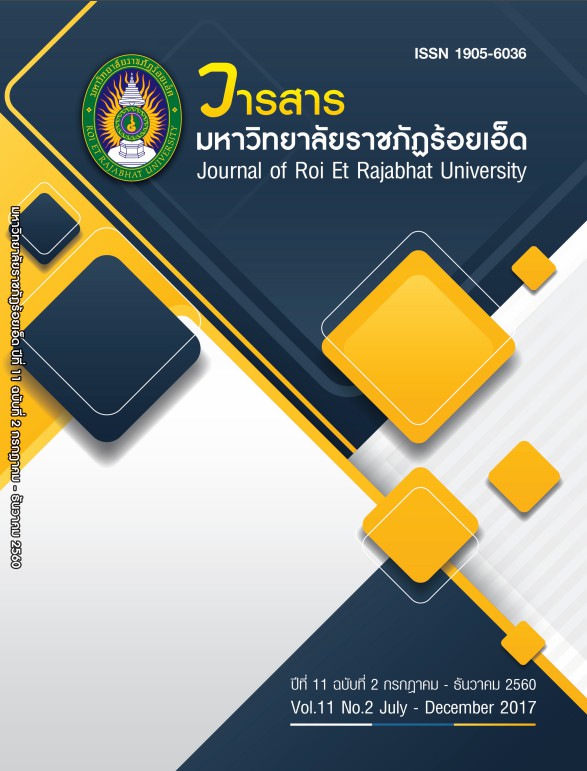Knowledge Transfer Capability versus Knowledge Sharing Capability and Knowledge Creation Capability in Context of Sufficiency Economy Philosophy: Evidence from Community Enterprise Group in Thailand
Keywords:
Knowledge Sharing Capability, Knowledge Transfer Capability, Knowledge Creation CapabilityAbstract
Currently business is highly competition. Furthermore, business operations are under a dynamic
environment. Therefore, knowledge transfer capability and knowledge sharing capability are important
issues for businesses to continue in competitive capability and business sustainability under the above
conditions. Knowledge transfer capability and knowledge sharing capability have been viewed as one key
component that influences business sustainability. Drawing on the knowledge based view and resource
based view theory that explain the relationships of the model, the purpose of this paper is to present
the relationships among knowledge transfer capability versus knowledge sharing capability, knowledge
creation capability and business sustainability. The model is empirically tested by using data collected
from mail surveys from among community enterprise group in Thailand. Executives or leaders of community
enterprises of each group are the key informants. Descriptive statistics, correlations, and multiple regression
analyses are utilized to examine and demonstrate the relationships among the independent variables
and the dependent variables which are proposed as five testable hypotheses. The results reveal that
the posited both knowledge transfer capability and knowledge sharing capability have positive associations
References
http://smce.doae.go.th
Agrawal, A. K. (2001). University-to-industry knowledge transfer: Literature review and
unanswered questions. International Journal of Management Reviews, 3(4), 285-302.
Argote, L., & Ingram, P. (2000). Knowledge transfer: a basis for competitive advantage in firms.
Organizational Behavior and Human Decision Processes, 1(82), 150-169.
Armstrong, S. J., & Overton, T. S. (1977). University-to-industry knowledge transfer: Literature
review and unanswered questions. Journal of Marketing Research, 3(14), 396-402.
Balogun, J., & Jenkins, M. (2003). Re-conceiving change management: A knowledge-based
perspective. European Management Journal, 2(21), 247-257.
Barney, J. (1984). Strategic factor markets: Expectations, luck, and business strategy.
Management Science, 10(32), 1231-1241.
Barney, J. (1991). Firm resources and sustained competitive advantage. Journal of
Management, 1(17), 99-120.
Brennenraedts, R., Bekkers, R., & Verspagen, B. (2006). The different channels of universityindustry
knowledge transfer : Empirical evidence from biomedical engineering.
Eindhoven: Technische Universiteit Eindhoven.
Garavelli, C. A., Gorgoglione, M., & Barbara, S. (2002). Managing knowledge transfer by
knowledge technologies. Technovation, 5(22), 269-279.
Hair, J., Black, W. C., Barbin, B. J., & Anderson, R. E. (2010). Multivariate data analysis. New
Jersey: Pearson Education International.
Hoskisson, R. E., Michael, H. A., William, W. P., & Daphne, Y. (1999). Theory and research in
strategic management: Swings of a pendulum. Journal of Management, 3(25), 417-
456.
Kogut, B., & Zander, U. (1993). Knowledge of the firm and the evolutionary theoy of the
multinational corporation. Journal of International Business Studies, 4(24), 625-645.
Krogh, G. V., Nonaka, I., & Rechsteiner, L. (2012). Leadership inorganizational knowledge
creation: a review and framework. Journal of Management Studies, 1(49), 240-277.
Le, C., & Fong, P. S. (2012). Revealing performance heterogeneity through knowledge
management maturity evaluation: A capabilities-based approach. Expert Systems with
Applications, 18(39), 13523-13539.
Nickerson, J., & Zenger, T. E. (2004). A Knowledge-Based Theory of the Firm. Organization
Science, 6(15), 617-632.
Piboolsravut, P. (2004). Sufficiency Economy. ASEAN Economic Bulletin, 1(24), 127-134.
Prahalad, C. K., & Hamel, G. (1990). The core competence of the corporation. Harvard
Business Review, May-June, 79-91.
Pulakos, E. D., Dorsey, D. W., & Borman, W. C. (2003). Hiring for knowledge-based competition.
San Francisco: JosseyBass.
Rouse, M. J., & Daellenbach, U. S. (2002). More thinking on research methods for the
resource-based perspective. Strategic Management Journal, 10(23), 963-967.
Smith, K. G., Collins, C. J., & Clark, K. D. (2005). Existing knowledge, knowledge creation
capability, and the rate of new product introduction in high-technology firms.
Academy of Management Journal, 2(48), 346-357.
Stevens, J. (2002). Applied multivariate statistics for the social sciences. New Jersey:
Lawence Erlbaum Associates.
Teece, D. J., Pisano, G., & Shuen, A. (1997). Dynamic capabilities and strategic management.
Strategic Management Journal, 7(18), 509-533.
Tsoukas, H. (1996). The firm as a distributed knowledge system: a constructionist approach.
Strategic Management Journal, 17(52), 11-25.
Wiklund, J., & Shepherd, D. (2003). Knowledge-based resources, entrepreneurial orientation,
and the performance of small and mediumm-sized businesses. Strategic
Management Journal, 13(24), 1307-1314.
Wright, P. M., & Scott, S. (2000). Toward a unifying framework for exploring fit and flexibility in
strategic human resource management. Academy of Management Review, 4(23), 756-772.
Yamane, T. (1973). Statistic: An introductory analysis. New York: Harper and Row.
Zollo, M., & Winter, S. G. (2002). Deliberate learning and the evolution of dynamic
capabilities. Organization Science, 13, 339-351.
Zuo, M. Y. (2003). Knowledge transfer in firm informatization. Chaina Managament
Informationization, 10, 10-11.
Downloads
Published
How to Cite
Issue
Section
License
บทความที่ได้รับการตีพิมพ์เป็นลิขสิทธิ์ของวารสารมหาวิทยาลัยราชภัฎร้อยเอ็ด
ข้อความที่ปรากฏในบทความแต่ละเรื่องในวารสารวิชาการเล่มนี้เป็นความคิดเห็นส่วนตัวของผู้เขียนแต่ละท่านไม่เกี่ยวข้องกับมหาวิทยาลัยราชภัฎร้อยเอ็ด และคณาจารย์ท่านอื่นๆในมหาวิทยาลัยฯ แต่อย่างใด ความรับผิดชอบองค์ประกอบทั้งหมดของบทความแต่ละเรื่องเป็นของผู้เขียนแต่ละท่าน หากมีความผิดพลาดใดๆ ผู้เขียนแต่ละท่านจะรับผิดชอบบทความของตนเองแต่ผู้เดียว



